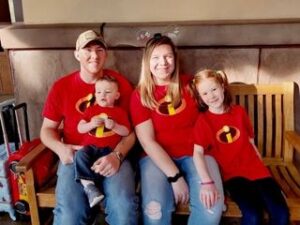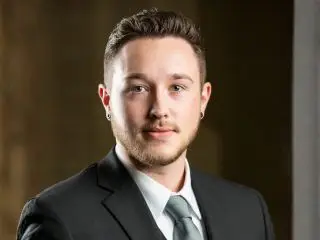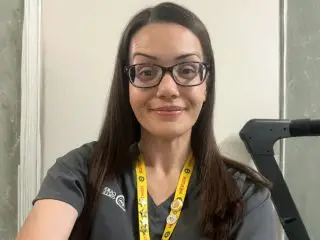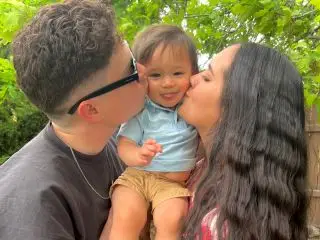 If you ever bet against Liz Smith, be prepared to lose your money. She’s a woman on a mission. She has a goal, a timeline, and a plan to make it happen. Liz, who lives in Sparks, Nevada with her husband, eight-year-old daughter and three-year-old son, enrolled in Carrington’s Medical Assisting program on the Reno campus in June, 2020. She completed the MA program in February, 2021 and began her Health Studies online degree-completion program one month later. She’ll finish that program in December and will then pursue her associate degree in nursing at Carrington in February, 2022. If everything goes according to plan, Liz will graduate in April, 2023, sit for the National Council Licensure Examination for Registered Nurses (NCLEX-RN), and launch her career as a registered nurse soon thereafter. We talked with Liz, 27, about attending classes through the pandemic; the challenges of juggling school, a family and a career; and the power of goal-setting.
If you ever bet against Liz Smith, be prepared to lose your money. She’s a woman on a mission. She has a goal, a timeline, and a plan to make it happen. Liz, who lives in Sparks, Nevada with her husband, eight-year-old daughter and three-year-old son, enrolled in Carrington’s Medical Assisting program on the Reno campus in June, 2020. She completed the MA program in February, 2021 and began her Health Studies online degree-completion program one month later. She’ll finish that program in December and will then pursue her associate degree in nursing at Carrington in February, 2022. If everything goes according to plan, Liz will graduate in April, 2023, sit for the National Council Licensure Examination for Registered Nurses (NCLEX-RN), and launch her career as a registered nurse soon thereafter. We talked with Liz, 27, about attending classes through the pandemic; the challenges of juggling school, a family and a career; and the power of goal-setting.
How did you first learn about Carrington?
My husband and I were driving in Reno one day and while we were talking about the possibility of me returning to school, when we drove by the Carrington College campus. He said we should research the possibilities of using his G.I. Bill benefits for my education, and to see if they could be applied to programs at Carrington. We discovered I was eligible, so I scheduled a campus visit. I liked what I saw and decided to apply. At that point, I’d been out of high school for eight years. I was ready to return.
You applied to Carrington in March, 2020, at the very beginning of the pandemic, and started classes three months later. What was it like attending classes during that time?
I know that a lot of programs only offered classes remotely, but the Medical Assisting classes on the Reno campus were taught in person. We followed strict safety protocols, including masks and social distancing. There were 20 students in my class, and I think we were all grateful to be together and learning in the classroom during such an intense time. Medical Assisting is a very hands-on, face-to-face, high-touch job. It would have been much more challenging to learn if we were all sitting at home looking at our computer monitors.
What did you like most about the Medical Assisting program?
I really enjoyed the interaction with my teachers. They were both personable and very knowledgeable in the field. Each had worked as a Medical Assistant for 20 years, so they knew exactly what we needed to know. What they taught us wasn’t theoretical. It was practical, useful information that we would apply in the field once we started working.
What attracted you to a career in healthcare?
When I was a teenager, I worked as a dog groomer. I also scooped ice cream. I enjoyed working with the public, but I always knew I wanted more—and that I wanted to interact with people in a different way. I became a Red Cross volunteer in Washington for four years. I also worked as a nursing assistant at the V.A. Medical Center in Reno, so I knew what caring for patients involved. When you’re providing medical care and support, there’s a level of appreciation and respect you often don’t get when you’re working in a retail or service position.
As someone who balances the responsibilities of a family, a full-time job and a college program, what advice would you give someone who questions whether they could it?
Whenever you’re trying to do a lot at the same time, you’ve got to be organized and focused. You’ve got to have a goal and a realistic plan to achieve it. Good time management and learning how to prioritize aren’t always easy, but they’re essential. For me, it’s also important to always think ahead and to anticipate roadblocks so I can avoid them. My schedule was very planned and structured. It had to be. Throughout my Medical Assisting program, I was working Monday through Friday as a customer service rep for a building insulation company. I also had class every Tuesday and Thursday night. I did most of my studying after my kids went to bed and on weekends. There were definitely times when I was tired, but I never doubted I could do it. My mother worked two full-time jobs and went to school while raising a family, so I have a good role model. I’m also lucky—and grateful—to have a supportive husband and family and friends who I can rely on in a scheduling pinch.
You’re currently working as a Medical Assistant at an urgent care facility. How did you land that job?
On the Reno campus, Medical Assisting students often have their choice of three externship venues. I was hoping to work in cardiology, but it was about nine months into the pandemic and the cardiology practice wasn’t accepting externs at that time. As it turned out, everything worked out beautifully. On the first day of my externship, one of my supervisors told me it seemed like I really knew what I was doing. He asked me if I would consider accepting a full-time position if one was offered when my externship ended. I said yes! It was great not to have to think about looking for a job when I completed my program.
What would you tell someone who might be thinking about enrolling in the Medical Assisting program?
If you’re considering any career in the medical field, I think it’s important to do your homework and make sure it’s what you want to do. It’s a great career, but it’s not for everyone. Ask questions. Talk with people who are already doing the job you think you want and find out what they like—and don’t like—about the work they do every day. If you decide it’s something you’re passionate about, commit yourself fully. Invest the time and energy necessary to get a solid education so you can excel in your profession and be your best.



